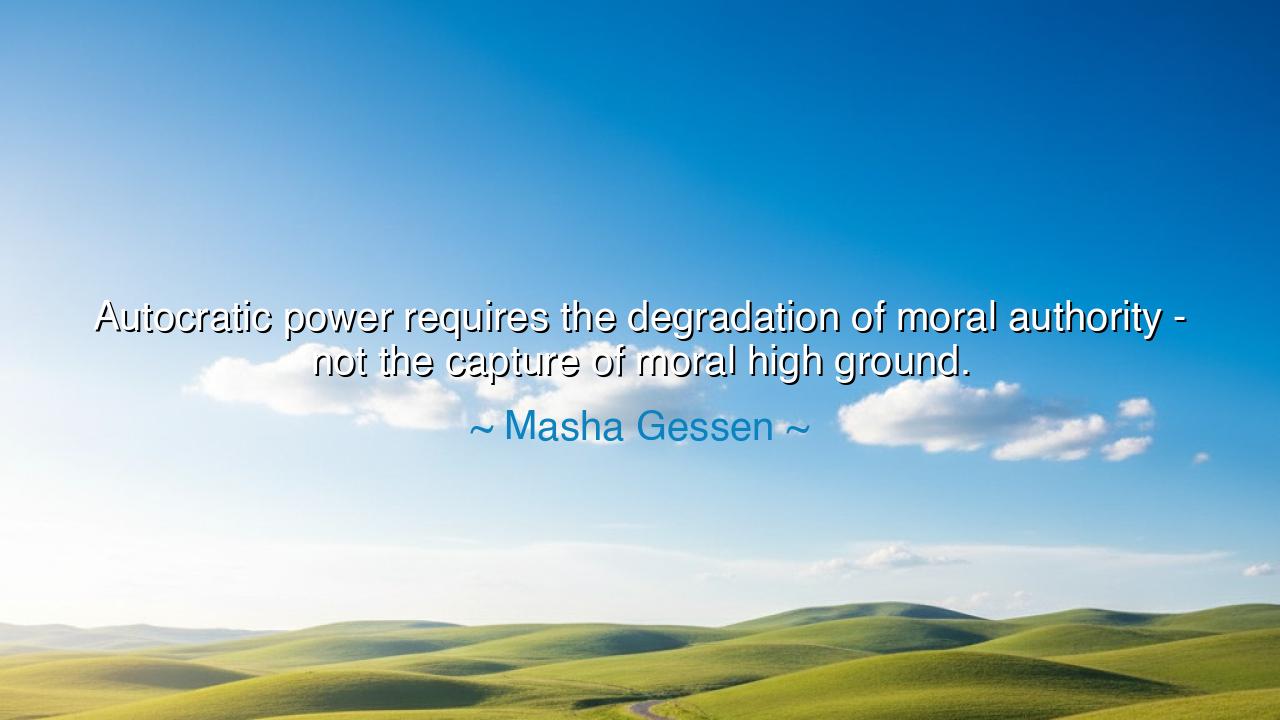
Autocratic power requires the degradation of moral authority -
Autocratic power requires the degradation of moral authority - not the capture of moral high ground.






Hearken, children of the ages, to the piercing words of Masha Gessen, who proclaimed: “Autocratic power requires the degradation of moral authority—not the capture of moral high ground.” In these words lies the eternal truth of authority, virtue, and the peril of tyranny. True dominion, when exercised without restraint, does not seek the heights of ethical example; rather, it corrodes the very moral foundations that sustain society, replacing honor with fear, obedience with submission, and justice with expedience.
Gessen teaches that tyranny thrives not by righteousness, but by erosion of principle. The autocrat does not ascend by embodying virtue, but by undermining the ethical compass of the people and the institutions meant to uphold justice. By degrading moral authority, power becomes unchallenged, yet hollow, built not upon the consent of conscience but upon the submission of will. It is a stark reminder that the pursuit of authority without virtue poisons both ruler and realm.
Consider the life of Nero, Emperor of Rome, whose unchecked power led him to debase moral authority, indulge in cruelty, and punish the innocent. Nero did not rise by inspiring virtue or capturing the moral high ground; instead, he wielded terror, undermined the Senate, and silenced wisdom. His reign illustrates Gessen’s insight: autocratic power flourishes through degradation, not through the elevation of ethical example, and the consequences ripple through the lives of many.
The ancients themselves warned of this peril. Aristotle and Cicero taught that governance divorced from virtue leads to corruption, oppression, and decay. True authority is anchored in moral integrity; without it, laws and decrees become instruments of tyranny. Gessen’s reflection echoes this timeless lesson: the degradation of moral authority is the weapon of autocrats, while the moral high ground belongs to those who resist injustice and uphold conscience.
Thus, her counsel is both warning and guidance: be vigilant against the subtle corrosion of ethics in the halls of power. Observe actions, not rhetoric; recognize that the elevation of principle, not fear or spectacle, is the measure of true governance. Autocrats seek to erode the moral foundations of society, and it is the duty of the wise and courageous to preserve them.
Carry this teaching, children of generations yet unborn: honor moral authority, defend virtue, and resist the seduction of fear and expedience. For autocratic power may seem strong, but it is hollow when it degrades the conscience of the people, and it is only through the steadfast preservation of ethics that societies endure, flourish, and resist the decay of tyranny.






PCphuonganh Channel
I think Gessen captures something essential about how authoritarian systems function. Power that relies on fear and manipulation can’t coexist with genuine moral authority—it must replace it with loyalty or ideology. What fascinates me is how subtle this process can be. People may not even notice the moral degradation until it’s complete. It makes me wonder—how can individuals preserve personal ethics when the system around them rewards moral compromise?
3T35: Tam
This observation strikes me as painfully relevant. It implies that autocrats don’t just silence opposition—they reshape the moral landscape so that decency itself looks naive. I wonder if that’s why propaganda often mocks empathy or kindness as weakness. Once moral standards are ridiculed, cruelty becomes normalized. Can a society recover moral integrity once it’s been deliberately degraded, or does rebuilding it require generational effort and collective repentance?
NNngoc nguyen
Reading this, I can’t help but think about how moral authority becomes dangerous to autocrats—it’s the one thing they can’t control. To rule effectively, they have to discredit it. But this raises a question: if morality is constantly undermined, how do people recognize justice when they see it? It feels like a warning about complacency, reminding us that once the moral ground disappears, even truth itself becomes negotiable.
HGNguyen Ha Giang
I find this statement profoundly insightful. It suggests that autocracy survives by dismantling people’s belief in moral legitimacy. Instead of convincing others they’re right, such regimes convince them that right and wrong don’t matter. That’s terrifying because it turns cynicism into a political tool. Can societies protect themselves from this kind of moral erosion? Perhaps education and free discourse are the only real defenses against that slow, deliberate decay.
MPTran Minh Phu
This quote feels chillingly accurate. It makes me think about how authoritarian regimes thrive not by inspiring virtue but by undermining the very concept of moral truth. Once people stop believing in shared ethics, anything becomes permissible. But I wonder—does this mean moral decay is a prerequisite for tyranny, or a consequence of it? Maybe autocrats don’t just seize power; they corrode the moral compass that could resist them.